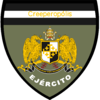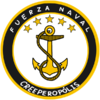Rubicon War
| Rubicon War | |||||||||
|---|---|---|---|---|---|---|---|---|---|
| Part of the Salisfordian Civil War and Creeperian Conflicts | |||||||||
| |||||||||
| Belligerents | |||||||||
|
|
| ||||||||
| Commanders and leaders | |||||||||
| Units involved | |||||||||
|
|
| ||||||||
| Strength | |||||||||
|
| ||||||||
The Rubicon War (Creeperian Spanish: Guerra del Rubicón; Salisfordian: Guerra del Rubicone) was a war which occurred in to phases between 1961 and 1976.
Contents
Background
Conflicts between Castilliano and Salisford
Rubicon Incident
In 1936, Salisford moved troops across the border with Castilliano and into Sant Pau (present-day San Pablo), citing historical claims to the northern territories of the region. Castilliano would reject these claims, and moved troops to intercept the Salisfordian soldiers. Both sides clashed and the fighting developed into a 3-week long intense border conflict. Before any side made a breakthrough, the Catholic Imperial Restoration Council (Imperial Council), concerned about the possibility of further escalation between the two nations, stepped in and helped negotiate an end to the fighting.
To convince the dissatisfied Salisfordian administration to agree to end the conflict, Adolfo Cabañeras Moreno, the minister of defense of the Imperial Council, secretly negotiated a deal with the Salisfordians to partition Castilliano sometime in the near future, promising Salisford the northern half of the country. In return, the Salisfordians agreed to send an expeditionary force to assist the Imperial Council in breaking the stalemate which has developed in the Creeperian Civil War.
Annexation of Castilliano
Following the conclusion of the civil war in 1949, Castilliano held a referendum on 1 December 1949 to decide if it should be annexed by Creeperopolis or not. The referendum resulted in favor of annexation by a large margin, but many called into question the legitimacy and the legality of the votes and the referendum itself. Despite the brewing controversy, the ruling party of Castilliano, the right-wing Castillianan Coalition of Autonomous Rights (CCDA), which heavily campaigned in favor of the referendum, accepted the results of the vote and Creeperopolis formally annexed Castilliano on 25 December 1949.
Despite the previous agreement to cede Castillianan land to Salisford, Creeperopolis refused to cede any land to Salisford after Castilliano's annexation. Alfonso Cabañeras Moreno, who had succeeded his older his brother as minister of defense in 1944, stated that he was under obligation to fulfill the agreement as the agreement was made by his older brother and not himself. He also stated that the annexation referendum was for Castilliano in its entirety, and that the land promised to Salisford was included in that referendum regardless.
Social unrest in Castilliano
Rise of Sandro Neri in Salisford
Prelude
Order of battle
Creeperopolis
 Creeperian Army
Creeperian Army
 32nd Army – General Raimundo Serrano Suñer[note 1]
32nd Army – General Raimundo Serrano Suñer[note 1]
 91st Infantry Division – Lieutenant General Gustau Riviéra e Cabriéra
91st Infantry Division – Lieutenant General Gustau Riviéra e Cabriéra
- 67th Infantry Battalion – Brigadier Romulo Enríquez Revelo
- 74th Infantry Battalion – Brigadier Alexandre Léon e Pérre
- 75th Infantry Battalion – Brigadier Fabián León Flores
- 80th Infantry Battalion – Brigadier Maximiliér Alvaréu e Alvaréu
- 81st Infantry Battalion – Brigadier Sergio Zorro Juárez
- 16th Engineer Company – Lieutenant Colonel Enrique Hidalgo Fuentes
 36th Mechanized Division – Lieutenant General Armando Pacheco Jalisco
36th Mechanized Division – Lieutenant General Armando Pacheco Jalisco
- 16th Mechanized Battalion – Brigadier Cristól Escócia e Piéira
- 17th Mechanized Battalion – Brigadier Félix Casanova Bermúdez
- 23rd Mechanized Battalion – Brigadier Xavier Montt Salinas
- 28th Mechanized Battalion – Brigadier Juan Duarte Linares
- 30th Mechanized Battalion – Brigadier Pablo Córdoba Galván
- 17th Engineer Company – Lieutenant Colonel Norberto Ureña Iñez
 22nd Armored Division – Lieutenant General José Fuentes Castro
22nd Armored Division – Lieutenant General José Fuentes Castro
- 8th Armored Battalion – Brigadier José Nuñez Payés
- 16th Armored Battalion – Brigadier Marcéu Guerriér e Rosér
- 22nd Armored Battalion – Brigadier Carles Carriéra e Flors
- 24th Armored Battalion – Brigadier Vicente Fernández Jalisco
- 30th Armored Battalion – Brigadier Héctor Rodríguez Molina
 30th Artillery Division – Lieutenant General Léonard Ramiéra e Umana
30th Artillery Division – Lieutenant General Léonard Ramiéra e Umana
- 34th Artillery Battalion – Brigadier Jórdi Cadiérs e Guilhém
- 35th Artillery Battalion – Brigadier Alfonso Dávalos Herrador
- 43rd Artillery Battalion – Brigadier Danielér Serán e Lóbi
- 45th Artillery Battalion – Brigadier Gonzalo Sánchez Obregón
 Creeperian Air Force
Creeperian Air Force
 18th Air Force Wing – General Fidel Salinas Quijada
18th Air Force Wing – General Fidel Salinas Quijada
- 22nd Air Force Division – Lieutenant General Osiel López Pérez
- 32nd Air Force Division – Lieutenant General Roberto Quijada Ureña
Salisford
 Royal Salisfordian Army
Royal Salisfordian Army
 3rd Brigade – Lieutenant General Antiamo Marchetti
3rd Brigade – Lieutenant General Antiamo Marchetti
 147th Paratroopers Regiment – Colonel Giacomo Conte
147th Paratroopers Regiment – Colonel Giacomo Conte 42nd Infantry Regiment – Brigadier General Omar Bianchi
42nd Infantry Regiment – Brigadier General Omar Bianchi 75th Infantry Regiment – Brigadier General Renzo Testa[note 2]
75th Infantry Regiment – Brigadier General Renzo Testa[note 2] 4th Armored Regiment – Brigadier General Vincenzo Moretti
4th Armored Regiment – Brigadier General Vincenzo Moretti 2nd Fusilier Regiment – Brigadier General Ercole Fabbri
2nd Fusilier Regiment – Brigadier General Ercole Fabbri
 Royal Salisfordian Air Force
Royal Salisfordian Air Force
 70th Attack Wing – Major General Tommaso Costantini
70th Attack Wing – Major General Tommaso Costantini
First phase
Low-level fighting
Second phase
Peace agreement
Aftermath
Casualties
Effect on bilateral relations
See also
- Surian Fishing War, another war in Sur involving Creeperopolis occurring at the same time
Notes
- ↑ Upon Serrano Suñer's death, he was replaced as commander of the 32nd Army by General Venustiano Zaldívar Herrera of the 2nd Army.
- ↑ Upon Testa's death, he was replaced as commander of the 75th Infantry Regiment by Brigadier General Lazzaro Sartori.










